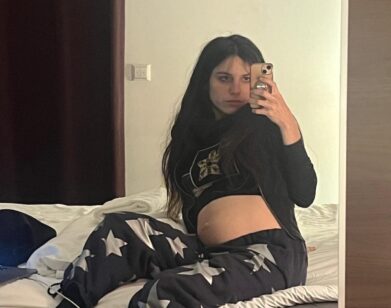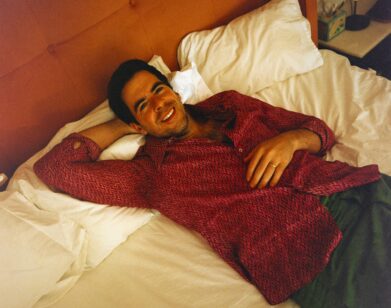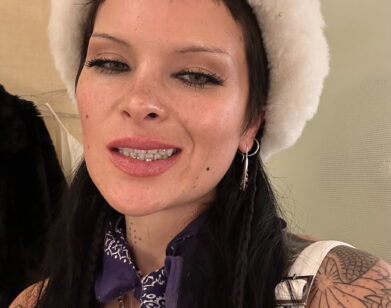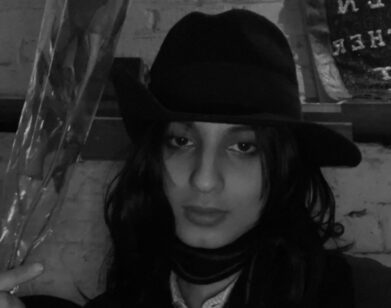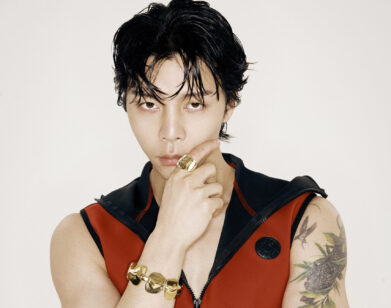Karen Elson’s Second Swing
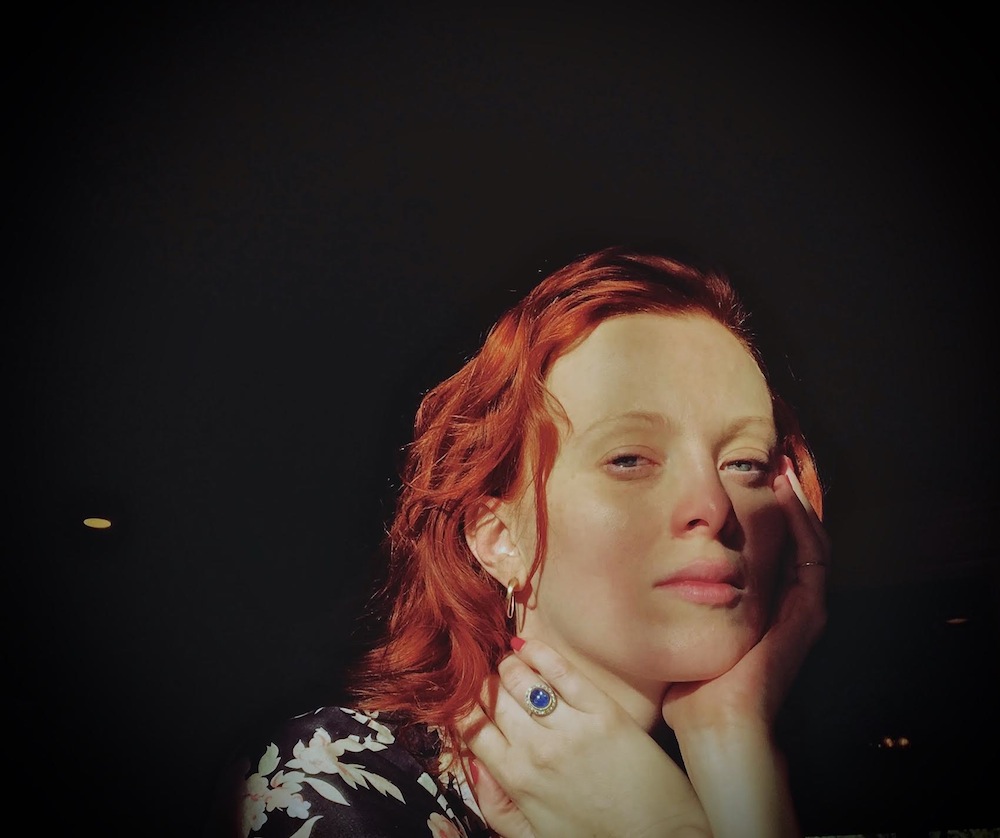
PHOTO COURTESY OF KAREN ELSON.
When Karen Elson released her debut album The Ghost Who Walks in 2010, she declared herself a musician, one “proud” of her celebrated career as a model but equally dedicated to her craft. Last week with the release of her second LP, Double Roses (H.O.T.), she cemented herself as an author of poetic folk songs, unafraid of baring herself to listeners. Though she undoubtedly holds the title singer-songwriter after writing every track on Roses, she admits that she fears the hyphenate. “Maybe that’s why it’s taken me so long to even make another record,” she says. “Because I’ve got an ego, I don’t want to put my name on something if I’m not going to come out swinging.”
Elson, who describes herself as “a strange bird,” recently spoke to Father John Misty (a.k.a. Josh Tillman), her friend and collaborator, by phone. Tillman makes an appearance on Roses, and released his latest album, Pure Comedy, on the same day as Elson. Here, the two discuss becoming cobblers, “headfuckery,” and the emotional tumult of the creative process.
KAREN ELSON: Josh, I’ve just been listening to your record. I drove back from the Smoky Mountains, and it’s been on going there and going back. Honestly, I think I listened to “Leaving LA” 20 times.
JOSH TILLMAN: I think you can listen to “Leaving LA” almost all the way through on a drive too.
ELSON: Oh my god, it’s gorgeous. I’m just going to say it’s your Leonard Cohen‘s “Hallelujah,” I’ve got to say that.
TILLMAN: Aw, Karen.
ELSON: It’s so funny, knowing a little bit of you, there are so many beautiful tender and hilarious moments. It made me cry; I’m not joking either. I’m driving through the Smoky Mountains like [imitates crying] sobbing.
TILLMAN: [laughs] I was going to call the record “Tender Hilarity.”
ELSON: I understand that a lot. How are you doing, Josh?
TILLMAN: I’m great, I’m incredibly nervous.
ELSON: You’re incredibly nervous?
TILLMAN: Yes.
ELSON: Why?
TILLMAN: Well, you’re a notoriously combative interview.
ELSON: Oh, you know it. We’re going to fight by the end of it and never speak again.
TILLMAN: When the interview is over I’ll just go on to become a cobbler or something.
ELSON: [laughs] Didn’t that happen to Daniel Day-Lewis? He got so sick of making movies that for a while he lived in Italy. I guess he has a thing for shoes. For real, I’m not even joking right now. He became a cobbler for a while.
TILLMAN: My theory is that he’s just in method prepping for the role of a lifetime about a cobbler.
ELSON: Oh man, what have you been up to you? So sweet talking to you for an interview, isn’t it?
TILLMAN: It’s great. I’m right in the middle of my press, so just talking about myself.
ELSON: I know. I did an interview before I spoke to you. There comes a point where certain things are becoming my Achilles heel; you know when you start repeating yourself and saying the same anecdotes over and over again you start slowly hating yourself?
TILLMAN: Yeah. I always think of that scene in I Heart Huckabees. That scene shook me to the core. It didn’t prevent me from telling the same story over and over, but when they play back that tape of him telling that goddamn chicken salad story.
ELSON: [laughs] I can relate. My problem is I maybe suffer with speaking English, and I’m also feeling my way through all of this and trying to not let on [that I’m] feeling like an amateur sometimes, and you have to talk about something that’s been so personal to you that’s intricately about you. About me. About the way I navigate through life. It becomes really strange, and I start feeling like a caricature of myself, but because I’m also a model, ironically sometimes I am a caricature of myself. It starts becoming this vortex where I suffer from being chronically honest; sometimes it gets translated and causes me personal problems, and people hold me accountable to things that I say, but I’m just trying to be forthright. I don’t know. I’m trying not to complain, but I’m really struggling with the idea of… It’s been so easy as a model, because I’ve never had to say anything, and even with music it’s just my inner world and the way I see things outside looking in, but having to talk about it is really fucking hard.
TILLMAN: Right. Well, the irony being that music is the best articulation of anything you can possibly say about yourself. You spend a very long time editing and re-editing and living these experiences. And music is the realm of the unspeakable.
ELSON: That’s right. It feels so beautiful as well, and that’s why, bringing it back to your record, as I was listening to it, there are so many things I hear you talk about on your record. I’m sure as much as you might try and as much as I might try to talk to somebody you don’t know about how you feel about certain things, it’s never going to be as expressed as poetically or as honest, in a way, as it is in a song. It’s a beautiful way, as you say; it’s this realm that is still quite untouchable. A movie’s a movie—you know I’m a massive old film buff—but it’s still something to me, music: I can still close my eyes like I was when I was a teenager, and it can still make me weep or make me angry or make me, even if it’s bad music, crack up.
I’m sort of glad to get all the promo out of the way for the record so I can actually focus on singing, because I start feeling like I’m a cardboard cutout of myself selling my vulnerability, marketing it somehow. That’s why I like your record. I feel like you touch so many fucking subjects, universal subjects that we’re all struggling with right now.
TILLMAN: I think the thing that’s interesting about being a songwriter is that you are cannibalizing your life. Do you know what I mean?
ELSON: Totally.
TILLMAN: So it’s not too far of a cry to do interviews, and everything is fair game.
ELSON: Yeah, it is. Particularly in a song, everything is fair game really.
TILLMAN: I can’t imagine what it would be like living with another songwriter. I have this experience with [my wife] Emma. It’s funny, I’ll be really unreasonable about something, and it’s like, “Oh it’s fine, she’ll get a great story out of that.”
ELSON: Exactly. And she probably will, right?
TILLMAN: Right, like, “I’m doing you a big favor by being so ridiculous about this right now.” [laughs]
ELSON: In my own life, in my own past so to speak, I can relate to that. You’re so right about cannibalizing everything in your life when you write a song, and that’s what I realized with this record. If I didn’t tap into my own dysfunction—knowing me, you’ve seen a little bit of it—if I can’t write about that stuff—
TILLMAN: You could barely get on this conference call.
ELSON: Barely. It’s as per usual. I really don’t like conference calls to be honest. It’s always something that bloody happens with a conference call—universally never works out. The fact that this actually worked out is quite astonishing to me.
TILLMAN: You know it’s funny, me interviewing you as opposed to being interviewed. The other morning, this has now been a two-day experiment, I was like, “I’ve got to quit smoking.”
ELSON: Oh, really?
TILLMAN: So I decided to do everything kind of the opposite? Lord help my neighbors, I hope they can’t see me, but I’ve been actually walking around the house backwards. [Elson laughs] Using my left hand, doing everything the opposite. And even now, doing this, it’s this idea—
ELSON: You’re living in the upside down, Josh. You’re role reversing in every possible way right now. In my own way [I’ve been]—not trying to stop smoking—self-sabotaging maybe is the word. In my own way of doing stuff backwards I definitely, for the past few months or the past six months, have been doing that. It’s funny, I woke up one day and I thought, “I can’t do this anymore. I can’t have this much chaos in my life.” Even though there are moments where it all feels so thrilling. You’re sort of like the Machiavellian beekeeper. I’ve had so much stuff buzzing around me, and then I just woke up one morning and went, “Can’t do this, and if I continue to do this, I’m going to be 60 years old and alone and miserable.”
TILLMAN: Well, to make music or to be creative is to open the door of madness, to live in a room where the door to madness is always ajar.
ELSON: Then you have to find moments to temper it too. I definitely think with this record, even when I went into the studio with Jonathan [Wilson] to make it, it was in this place of, reckless abandon might be too much, but the floodgates were open. It gets exhausting after a minute. It’s a funny thing thinking about now as the record is almost out and I’m sure—I probably should ask this to you, because you’ve made way more records than me—that fear is lingering of, “Do I need to function in dysfunction in order to get this stuff out? What would it be like to not have dysfunction and not create chaos in my wake in order to have some sort of creativity?” Speaking of the person I know we both really enjoy, Nick Cave, have you ever heard his lecture he did about songwriting?
TILLMAN: Yeah. He had a very…
ELSON: Structured way about it.
TILLMAN: Atomically disciplined approach to it, yes.
ELSON: I went back and listened to that and thought, “Could I do that?” I never have done it. It’s always come in fits and bursts, or not even fits and bursts—actually, it’s when I’m home alone in Nashville when everything comes crashing down on me, and I’m feeling my own self-judgment, that’s when everything seems to come out. It’s after the storm. It’s that funny thing when you think, “Can you function?” Because it’s such a cliché as well, a cliché of a musician or an artist, isn’t it?
TILLMAN: I mean, sure it is. It depends—it’s only a cliché if your work is bullshit. There is an interesting thing about the way Nick Cave approaches writing; I think on the surface, he thinks that is a way to mitigate the pain of the creative process. When, in fact, it is inviting pain into your life, almost daily. Everyone’s batting average is only so high. The thought of going to the office and just staring into the middle distance berating yourself, you spend so much time thinking that you’re no good, this is when you ask the question of, “Can I live with this? Is it worth it to live with this dysfunction or self-doubt?”
ELSON: Whatever your version of how, it all gets out. It’s always really complicated, I’ve realized, from everybody I’ve ever met who makes music or any form of art. It’s always complicated.
TILLMAN: The dysfunction and self-doubt are part of everyone’s life.
ELSON: Oh yeah. I’ve not met one person, even if they are not creative, who isn’t dysfunctional. I guess artists are just a bit more aware of their dysfunction because it serves a purpose.
TILLMAN: But the great lovely irony is that is it really dysfunction if it serves a function?
ELSON: Oh, wow. Beautiful. I’ve never thought of it that way. God, Josh. [laughs] Holy cow. Maybe it’s not then, I don’t know. Maybe it’s because society tells you that, when you go and see the therapist, “Well, blah blah blah, this is what’s going on with you,” and you walk out feeling less resolved and more confused and fucked up than ever. Not to get too depressing, I’ve always been a slight whirling dervish in my life. I’ve always been at once a very spritely and energetic hilarious lady, but at the same time there is an equal dark side that’s as comparable to the jovial—constantly walking on the high wire trying to figure out who to be each day. Like, “Am I feeling good today?” or, “Am I feeling God knows what a million and one things?” That’s the funny thing about listening to your song; you kind of gave me a breakdown today, Josh. [laughs] Literally, it’s amazing how certain words can fuck you up. That’s why I like singing my heart out, because it’s so beautiful when those moments happen.
TILLMAN: Yes. I mean, there are no funny, happy people.
ELSON: Every comedian I’ve ever met ultimately, behind the mask, exactly—it’s so true.
TILLMAN: It is alchemy. I think that the real danger is that creativity, the creative final function of writing music, is to find the unconscious, which—I’m just off the top of my head here, I’m going to lose the runway real quick. The difference between being creative and the media-cultivated personality perception is that when you’re creating, you are looking through yourself. What you’re really doing is this curation about me that resonates on the same harmonic frequency of everyone else. It’s that even with when you draw these little details in your life that seem to have nothing to do with anyone other than you, in my experience, those are the things that end up resonating with people the most. And it doesn’t really make any sense on paper, but the whole enterprise is about a resonation with other people. The interview media thing can very quickly become just looking at yourself.
ELSON: That’s definitely what I’ve been experiencing, looking at myself recently. And I don’t want to sound like I don’t like the attention, of course I love the attention—I’d be a liar to say I didn’t—but there is that moment of truth.
As a model I had a lot of success when I was 17 and 18 years old. It was before social media, before the world was what the world is, but even then it was terrifying, to be 18 years old and people knowing who you are, and I was this personality who was completely devoid of who I actually was. It was almost like being a manufactured boy band. You’re sort of like a wind up doll; they wind you up and put you on the runway or something like that. It was really interesting for me making music, because since that moment I’ve always had this very strange relationship with what fame is, because I saw so young just how elusive it is. We all know people who are ridiculously famous, and it’s a scary thing because all of the sudden people—even the people you are close to—stop being honest with you, stop telling you the truth. They view you as an otherworldly deity and I’ve always strangely—as I’ve said I love attention, I’m not going to deny that, I like that and I’m happy that people like my music and I want to make more music—had this, it’s not a fear, but a real outsider-looking-in [view] into my entire life. I know I’m never going to be globally famous in that sense and I don’t want it, because I see how destructive that stuff is. Even doing interviews, I have this moment of truth where I hang up the phone, and there’s just silence for two minutes before the other person calls. This moment of self-reflection, like, “What the fuck am I saying?” [laughs]
TILLMAN: You’re doing wonderful.
ELSON: I mean, I’m doing. I’m finally doing what I want to do, which is wonderful, but you know what I mean. Two minutes of silence where you have this life crisis, because it’s not therapy. It’s not like you’re talking to somebody. It’s like you’re selling your version of yourself for your record so you can justify your record, but it becomes very strange.
TILLMAN: There’s no coincidence in people who seek fame, like you or I, because the fact of the matter is there’s no one in a position of fame who hasn’t made a 100 choices along the way to proceed. There are no shortage of moments where you can go, “I’m freaked out, no more. I’m going to go become a cobbler.” But most of the people that I know who have pursued this are incredibly anxious people. I was reading this John Waters interview one time, and he was saying that he loved being famous, because at any party that he went to he was a known quantity. And it is incredible to think that that form of social anxiety is so worth mitigating that you would subject yourself to the kind of madness and headfuckery that comes with being famous, just so you didn’t have to feel awkward at parties.
ELSON: Right, there you go. It’s all a moment of perspective, isn’t it?
TILLMAN: Yeah. You also have to remember that—when I listen to this record, which is just a total and complete triumph of almost a lightning-in-a-bottle conversion of talent for the people that are involved—if you don’t put yourself out there, then you cannot attract the people necessary to make the kind of things that you want.
ELSON: Absolutely. And there’s a sacrifice to your life at times with that. We both know that.
TILLMAN: You become, in some respects, the collateral damage to make the thing that you have to make. This record, its volume and statement, is so deafening. The only person in your interviews that feels louder than the music that you’ve made is you. The album is—there is no interview, well maybe this one, that will be more legendary.
ELSON: Already I think it certainly will be. [laughs] Mainly because you haven’t asked me about my ex-husband quite yet.
TILLMAN: Oh, right, God. … There’s so much empathy for the subject in this album, for the person: there is a level of empathy and universality that really informs the way the arrangements come across. We were talking earlier about Jonathan’s role in shaping the sound of the record, but what I hear most of all is that your note choices and the way you’re singing and where you choose to hold things is really influencing the way that everyone is playing. Their inversion and the harmonic structure of the strings and all that really seems to be taking cues from your note choices, and it has this coherence that’s very rare. And even on that “Why Am I Waiting” song, almost every time that line comes back around, it seems recontextualized.
ELSON: Oh, completely, and it was as I was writing it.
TILLMAN: That, to me, that’s something that I could not do.
ELSON: Oh, come on.
TILLMAN: I’m so anxious or something as a writer, but when I hear that, I just don’t think you should diminish your role. It sounds the way it does because—and this also plays into being a model, if you think of clothes or whatever as being an arrangement—it is all about the context. There’s a human context to clothing, to design: Things only come to life because of the person.
ELSON: Oh, absolutely. It’s funny that you bring this point up, because, I’ll be honest, I am still learning to just own this as well. I think this comes to my own insecurities, being a model, being married to a famous rock star so to speak, the ex-wife of. They always say your own worst enemy is yourself. I’ve been through this record, when I listen to this record while I’m playing it, as I’ve been playing a few shows recently, I feel the power. I’m the power behind it. These are my songs that I’ve really, honestly, labored long and hard over and poured my almost shameful and private thoughts out into. There is this moment where I am in this weird impasse that I’m really trying to break through, of my own hang ups, ultimately of not being taken seriously. It’s an interesting thing as a woman as well, because I’m having to fight myself constantly, as I’m sort of taking the backseat rather than taking the front seat. There is this thing that I’ve noticed, as a woman, a lot of people ask me about the men who contributed to the record, and there were a few moments during other interviews or in general talking about the record, where I realized that I have to break through this and really stand up and own it because ultimately, I wrote all the songs myself, in my little office in Nashville that I’m pacing around as I talk to you right now.
Something that I’m becoming much more aware of is how when someone pays you a compliment, it’s, “Oh, no, no, no. Please don’t, don’t say anything good about me.” Maybe it’s my Englishness. In a photograph, you’re sort of the silent visual, but it’s still your eyes burning through that photograph at the end of the day. It’s still my voice that is aching through those songs, and I think I’ve spent a lifetime in denial of my own power as a woman, and this whole record is really, actually, about me finding that again, about finding my voice and owning the vulnerability and the fearlessness that it takes to be vulnerable. It’s really hard to be truly vulnerable, it takes a lot of fucking courage.
FATHER JOHN MISTY IS AN AMERICAN MUSICIAN WHOSE ALBUM PURE COMEDY (SUB POP) IS OUT NOW. KAREN ELSON’S ALBUM DOUBLE ROSES (H.O.T.) IS OUT NOW. FOR MORE ON ELSON, VISIT HER WEBSITE.

